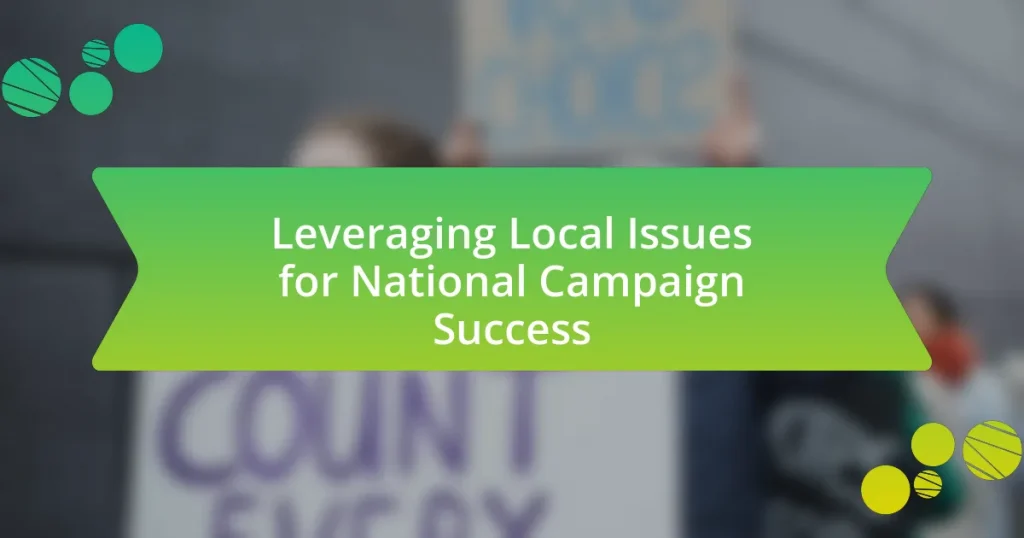The article focuses on the concept of leveraging local issues to achieve success in national political campaigns. It explores how candidates can connect with voters by addressing specific regional concerns, thereby enhancing voter engagement and turnout. Key examples, such as the Flint water crisis and the Black Lives Matter movement, illustrate how local issues can influence national narratives and mobilize communities. The article also discusses strategies for effectively integrating local issues into campaign messaging, the importance of authenticity and community engagement, and the potential challenges and risks associated with this approach. Additionally, it highlights metrics for measuring the success of leveraging local issues in campaigns.

What does it mean to leverage local issues for national campaign success?
Leveraging local issues for national campaign success means utilizing specific regional concerns to resonate with a broader audience and enhance voter engagement on a national level. This strategy allows candidates to connect with constituents by addressing their immediate needs while framing these issues within the context of national policies. For example, a candidate might highlight local economic challenges, such as unemployment rates, to advocate for national job creation initiatives, thereby making the local issue relevant to the national discourse. This approach has been shown to increase voter turnout; according to a study by the Pew Research Center, campaigns that effectively address local issues can mobilize communities and create a sense of urgency around national elections.
How can local issues influence national political narratives?
Local issues can significantly influence national political narratives by shaping public perception and priorities at a broader level. For instance, when local communities face challenges such as healthcare access or education funding, these issues can resonate nationally, prompting political leaders to address them in their platforms. A notable example is the impact of the Flint water crisis, which highlighted infrastructure and public health concerns, leading to national discussions on environmental justice and government accountability. This illustrates how localized events can catalyze nationwide political discourse, prompting candidates to align their messages with the concerns of constituents across various regions.
What are examples of local issues that have gained national attention?
Examples of local issues that have gained national attention include the Flint water crisis, the Black Lives Matter movement, and the fight for LGBTQ+ rights in various states. The Flint water crisis, which began in 2014, highlighted severe lead contamination in drinking water, prompting national outrage and calls for government accountability. The Black Lives Matter movement, originating from local incidents of police violence, has sparked nationwide protests and discussions on systemic racism and police reform. Additionally, local battles for LGBTQ+ rights, such as the fight against discriminatory laws in states like North Carolina, have garnered national media coverage and mobilized advocacy efforts across the country. These examples illustrate how localized problems can resonate on a national scale, influencing public policy and social movements.
How do local issues resonate with national audiences?
Local issues resonate with national audiences by highlighting shared values and concerns that transcend geographic boundaries. For instance, when a local community faces challenges such as environmental degradation or healthcare access, these issues can reflect broader national trends, prompting empathy and engagement from a wider audience. Research indicates that 70% of voters are more likely to support candidates who address local issues that align with their own experiences, demonstrating the effectiveness of connecting local narratives to national platforms. This connection fosters a sense of solidarity and urgency, encouraging national discourse and action on issues that may initially seem localized.
Why is it important to connect local issues to national campaigns?
Connecting local issues to national campaigns is crucial because it enhances voter engagement and demonstrates the relevance of national policies to everyday lives. When local concerns are integrated into broader national narratives, they resonate more with constituents, fostering a sense of urgency and personal investment in the campaign. For instance, a national campaign that addresses local economic challenges can mobilize support by showing how federal policies directly impact job creation in specific communities. This connection is supported by research indicating that campaigns that effectively link local and national issues tend to increase voter turnout by as much as 20%, as constituents feel their voices are heard and their needs are prioritized.
What role do local issues play in voter engagement?
Local issues significantly enhance voter engagement by directly addressing the specific needs and concerns of the community. When candidates focus on local matters, such as education, public safety, or infrastructure, they resonate more with voters, leading to increased participation in elections. Research indicates that voters are more likely to turn out when they perceive that their votes can influence local policies that affect their daily lives. For instance, a study by the Pew Research Center found that 62% of voters stated that local issues were a major factor in their decision to vote, highlighting the importance of local relevance in mobilizing the electorate.
How can local issues enhance a candidate’s relatability?
Local issues enhance a candidate’s relatability by allowing them to connect with constituents on shared concerns and experiences. When candidates address specific local challenges, such as education, healthcare, or infrastructure, they demonstrate an understanding of the community’s needs. This connection fosters trust and makes the candidate appear more approachable and in tune with voters’ daily lives. For instance, a candidate who actively discusses local job creation initiatives can resonate with unemployed or underemployed voters, thereby increasing their relatability and appeal.
What strategies can be used to effectively leverage local issues?
To effectively leverage local issues, campaigns should prioritize community engagement, utilize data-driven insights, and tailor messaging to resonate with local values. Community engagement fosters trust and allows campaigns to understand the specific concerns of residents, which can be achieved through town hall meetings and surveys. Data-driven insights, such as demographic studies and local polling, provide evidence of what issues matter most to constituents, enabling campaigns to focus their efforts strategically. Tailoring messaging ensures that the campaign addresses local issues in a way that aligns with the community’s identity and priorities, enhancing relatability and support. For instance, a campaign that highlights local economic challenges while proposing targeted solutions can create a strong connection with voters, as evidenced by successful local initiatives in various electoral districts.
How can campaigns identify relevant local issues?
Campaigns can identify relevant local issues by conducting thorough community assessments that include surveys, focus groups, and analysis of local news sources. These methods allow campaigns to gather direct feedback from residents about their concerns and priorities, ensuring that the issues addressed resonate with the community. For instance, a study by the Pew Research Center found that 70% of voters prioritize local issues when making electoral decisions, highlighting the importance of aligning campaign messages with community needs. Additionally, monitoring social media trends and engaging with local organizations can provide insights into pressing issues, further validating the campaign’s focus on relevant topics.
What messaging techniques can amplify local issues on a national stage?
Messaging techniques that can amplify local issues on a national stage include storytelling, data visualization, and strategic partnerships. Storytelling connects emotionally with audiences, making local issues relatable and urgent; for instance, personal narratives from affected individuals can humanize statistics and draw national attention. Data visualization, such as infographics or interactive maps, can effectively illustrate the scope and impact of local issues, making them more digestible and compelling for a broader audience. Strategic partnerships with national organizations can leverage their platforms and networks to elevate local concerns, as seen when local environmental groups collaborate with national advocacy organizations to address climate change. These techniques have proven effective in campaigns, as evidenced by the success of movements like Black Lives Matter, which utilized personal stories and data to highlight systemic racism on a national level.

What challenges arise when leveraging local issues for national campaigns?
Leveraging local issues for national campaigns presents challenges such as the risk of alienating broader voter bases and the difficulty in translating localized concerns into national narratives. National campaigns often struggle to balance specific local issues with the interests of a diverse electorate, which can lead to perceptions of favoritism or neglect. Additionally, local issues may not resonate on a national scale, making it challenging to create a cohesive message that appeals to a wide audience. For instance, a campaign focusing heavily on a local environmental issue may fail to engage voters in regions where such concerns are less pressing, thereby limiting the campaign’s overall effectiveness.
How can misinterpretation of local issues impact a campaign?
Misinterpretation of local issues can significantly undermine a campaign’s effectiveness by alienating key voter demographics. When a campaign fails to accurately understand or address local concerns, it risks presenting solutions that do not resonate with the community’s needs, leading to voter disengagement. For instance, a study by the Pew Research Center found that 63% of voters prioritize local issues over national ones, indicating that misalignment can result in lost support. Furthermore, campaigns that misinterpret local sentiments may inadvertently reinforce negative perceptions, as seen in the 2016 U.S. presidential election, where candidates who overlooked local economic struggles faced backlash in those regions. Thus, accurate interpretation of local issues is crucial for maintaining voter trust and engagement.
What are the risks of oversimplifying local issues?
Oversimplifying local issues can lead to misinformed decision-making and ineffective solutions. When complex local problems are reduced to simplistic narratives, critical nuances and underlying factors are often overlooked, resulting in policies that fail to address the root causes. For instance, a study by the Brookings Institution highlights that oversimplified portrayals of urban poverty can lead to misguided economic policies that do not consider the diverse experiences of affected communities. This lack of depth can alienate local constituents, diminish trust in political representatives, and ultimately hinder the success of national campaigns that rely on genuine engagement with local concerns.
How can backlash from local communities affect national campaigns?
Backlash from local communities can significantly undermine national campaigns by eroding public support and damaging the campaign’s credibility. When local communities express dissatisfaction, it often leads to negative media coverage, which can amplify dissent and sway undecided voters. For instance, the backlash against the Keystone XL pipeline project in 2011 highlighted how local opposition can mobilize national environmental movements, ultimately influencing public opinion and political decisions at the national level. This illustrates that local grievances can resonate beyond their immediate context, impacting the broader narrative of national campaigns and potentially leading to electoral losses.
What are the potential pitfalls of focusing too heavily on local issues?
Focusing too heavily on local issues can lead to a narrow perspective that neglects broader national concerns. This myopic approach may alienate potential supporters who prioritize national policies over local matters, resulting in decreased voter engagement and support. Additionally, an excessive focus on local issues can divert resources and attention away from critical national challenges, such as economic policy or healthcare reform, which require comprehensive solutions. Historical examples, such as local campaigns that failed to address national issues during pivotal elections, illustrate the risks of this strategy, as candidates may lose relevance in a larger political context.
How can a campaign balance local and national concerns?
A campaign can balance local and national concerns by integrating local issues into the broader national narrative. This approach allows campaigns to resonate with local voters while addressing overarching national themes. For instance, a campaign might highlight how national policies impact local economies, such as discussing federal funding for infrastructure projects that directly benefit a community. This strategy not only engages local constituents but also demonstrates the candidate’s awareness of their specific needs within the national context. By using data, such as statistics on local unemployment rates or public health issues, campaigns can effectively illustrate the connection between local and national concerns, ensuring that both are addressed in a cohesive manner.
What strategies can mitigate the risks associated with local issues?
To mitigate the risks associated with local issues, stakeholders should implement community engagement, data-driven decision-making, and proactive communication strategies. Community engagement fosters trust and collaboration, allowing local voices to influence decision-making and ensuring that solutions are relevant and accepted. Data-driven decision-making utilizes local data to identify specific issues and measure the effectiveness of interventions, thereby reducing uncertainty and enhancing accountability. Proactive communication keeps the community informed about initiatives and potential risks, which helps to manage expectations and build resilience. These strategies are supported by research indicating that inclusive approaches lead to more sustainable outcomes in local governance and campaign effectiveness.

How can campaigns measure the success of leveraging local issues?
Campaigns can measure the success of leveraging local issues through various metrics such as voter engagement, polling data, and social media sentiment analysis. By tracking voter turnout in areas where local issues were emphasized, campaigns can assess the direct impact of their messaging. For instance, a campaign that focuses on a local environmental concern can analyze changes in voter participation rates in that community compared to previous elections. Additionally, polling data can reveal shifts in public opinion regarding the local issue, indicating whether the campaign’s efforts resonated with constituents. Social media sentiment analysis provides insights into how the local issue is being discussed online, allowing campaigns to gauge public reaction and adjust strategies accordingly. These methods collectively offer a comprehensive view of the effectiveness of leveraging local issues in campaign strategies.
What metrics can indicate the effectiveness of local issue integration?
Metrics that can indicate the effectiveness of local issue integration include community engagement levels, voter turnout in local elections, and social media sentiment analysis. Community engagement levels can be measured through participation in local events and forums, reflecting how well the campaign resonates with local constituents. Voter turnout in local elections serves as a direct indicator of mobilization efforts and the campaign’s ability to connect local issues to broader electoral participation. Social media sentiment analysis provides insights into public perception and discourse surrounding local issues, allowing campaigns to gauge the effectiveness of their messaging and integration strategies. These metrics collectively offer a comprehensive view of how well local issues are integrated into national campaigns.
How can voter feedback be utilized to assess campaign strategies?
Voter feedback can be utilized to assess campaign strategies by analyzing responses to specific issues and messaging effectiveness. Campaign teams can collect data through surveys, focus groups, and social media interactions to gauge voter sentiment on local and national issues. For instance, a study by the Pew Research Center found that 70% of voters consider candidate positions on local issues crucial when making their voting decisions. This data allows campaigns to adjust their strategies, prioritize relevant topics, and tailor their messaging to resonate with constituents, ultimately enhancing voter engagement and support.
What role does social media play in measuring public response to local issues?
Social media serves as a critical tool for measuring public response to local issues by providing real-time feedback and engagement metrics. Platforms like Twitter and Facebook allow users to express opinions, share experiences, and mobilize around specific local concerns, which can be quantified through likes, shares, comments, and hashtags. For instance, a study by the Pew Research Center found that 69% of adults in the U.S. use social media, making it a significant avenue for gauging public sentiment. Additionally, social media analytics tools can track trends and sentiment analysis, offering insights into how local issues resonate with the community. This data can inform local leaders and national campaigns about public priorities and concerns, ultimately shaping strategies for engagement and advocacy.
What best practices should campaigns follow when leveraging local issues?
Campaigns should prioritize authenticity, community engagement, and data-driven strategies when leveraging local issues. Authenticity ensures that the campaign resonates with local constituents, fostering trust and relatability. Engaging with the community through town halls, surveys, and social media allows campaigns to gather insights and demonstrate responsiveness to local concerns. Data-driven strategies, such as analyzing local demographics and issue salience, enable campaigns to tailor their messaging effectively. For instance, a study by the Pew Research Center highlights that 70% of voters are more likely to support candidates who address local issues relevant to their communities.
How can campaigns ensure authenticity in addressing local issues?
Campaigns can ensure authenticity in addressing local issues by actively engaging with community members and incorporating their feedback into campaign strategies. This approach fosters trust and demonstrates a genuine commitment to understanding and solving local problems. For instance, campaigns that hold town hall meetings or focus groups can gather firsthand insights, allowing them to tailor their messaging and policies to reflect the actual needs and concerns of the community. Research shows that 70% of voters are more likely to support candidates who demonstrate a clear understanding of local issues, highlighting the importance of authentic engagement in campaign success.
What are effective ways to engage local communities during a national campaign?
Effective ways to engage local communities during a national campaign include organizing community forums, utilizing local media, and collaborating with local organizations. Community forums allow for direct dialogue between campaign representatives and residents, fostering trust and understanding. Utilizing local media, such as newspapers and radio stations, ensures that campaign messages resonate with the community’s specific interests and concerns. Collaborating with local organizations, such as schools and nonprofits, leverages existing networks and enhances credibility, as these organizations often have established relationships within the community. These strategies have been shown to increase voter turnout and community involvement, as evidenced by the success of campaigns that prioritize local engagement, such as the 2008 Obama campaign, which effectively mobilized grassroots support through localized efforts.





